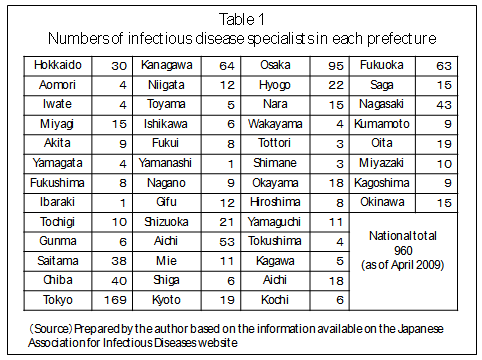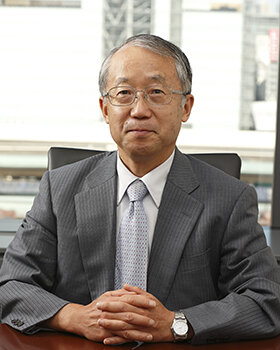Column Finance and the Social Security System 2009.09.07
Shortage of Infectious Disease Specialists
The deadly outbreak of the new influenza virus (H1N1 swine flu) has raised public interest in the domestic medical system for treating infectious diseases. Yet Japan has a shortage of physicians specialized in this area. As shown in Table 1, the number of infectious disease specialists in Japan is 960, which corresponds to 1 physician per 130,000 population on average. These specialists are not evenly distributed across the country, resulting in even lower per capita ratios in some prefectures such as Ibaraki, where a population of 2.92 million is served by only 1 infectious disease specialist. Most people expect that every physician, regardless of being trained or untrained as an infectious disease specialist, knows how to treat infectious diseases and can offer appropriate treatment to patients with infections. From my experience, however, the reality seems to be quite different from what the public expects.

When I was studying the laws, economic costs and healthcare delivery systems related to AIDS from 1992 to 1994, I had an opportunity to give a lecture at a meeting attended by more than 500 physicians. There, I was stunned by the first question from the audience, "how does HIV infection occur"? This meeting was held in 1993, and by then, the infection route of HIV should have been well known. I told the chairperson of the meeting that I was not sure if a nonprofessional like me should explain the mechanism of HIV infection to professionals, but the chairperson, who was a physician himself/herself, replied, "I don't know the mechanism either. Please explain it to us".
I recently had another experience which demonstrated the inadequacy of the infection control measures taken in clinical practice. A friend of mine was staying at a well-known hospital in Tokyo to receive cancer treatment. One day, I received an urgent call from his/her family, "(my friend) is complaining of chest pain. It may be pneumonia, but the doctor won't even check". I hurried to the hospital, only to be astonished by some appalling facts: the medical team continued to give an anticancer drug to a patient who had become exhausted from suspected symptoms of pneumonia; a young member of the medical team was aware of the necessity of testing the patient for infections but hesitated to make suggestions to his boss, the chief doctor; and this chief doctor, who was a specialist in anticancer drug treatment, was not interested in infections. The patient had to look for another hospital to get checked for infections and, as suspected, was diagnosed with severe bacterial pneumonia.
People with weakened immune systems, such as cancer patients and elderly patients with underlying diseases, are highly susceptible to infections. Yet, Japan has neglected to improve its medical system for treating infectious diseases. The weakness of this flawed system may be demonstrated in the outbreak of the new Influenza virus, which could take a heavy toll in our country. According to the Japanese Association for Infectious Diseases, there are about 1500 hospitals with 300 or more beds in Japan, and more than one infectious disease specialist should be assigned to each of these hospitals, which would require at least 3,000 to 4,000 of these specialists. I therefore suggest that we prioritize investment in medical infrastructure development, including the training of specialists, to combat infectious diseases.
